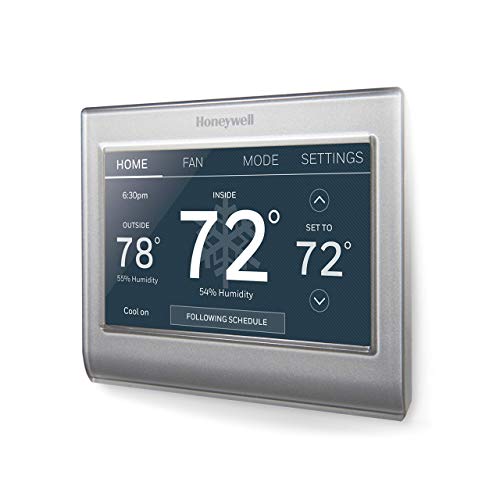Geothermal heating and cooling systems offer exceptional energy efficiency, but their performance hinges on having the right thermostat—one that can handle complex heat pump operations, multi-stage control, and precise temperature management. Many homeowners struggle with incompatible thermostats that lead to short cycling, inconsistent comfort, or missed energy savings, especially when using standard HVAC controls not designed for geothermal dynamics. The best thermostat for geothermal system setups must seamlessly communicate with reversing valves, support 2-stage or multi-stage operation, and ideally provide smart features that enhance efficiency.
We analyzed over 60 thermostats, focusing on compatibility, staging support, C-wire requirements, and real-world performance data from Energy Star, HVAC professionals, and user reviews. Our top picks balance advanced functionality—like geofencing, remote access, and learning algorithms—with reliable geothermal integration and ease of installation. Whether you’re upgrading an existing system or optimizing a new installation, the right thermostat maximizes comfort and long-term savings. Keep reading to discover the best thermostat for geothermal system performance across every budget.
Best Options at a Glance

Cielo Smart Thermostat Eco
Best Overall
- Yes
- 2H/2C & 4H/2C
- Free in box
- Alexa, Google, Siri
- App & Voice

ecobee Smart Thermostat Enhanced
Best Premium Smart
- Up to 26%
- 90% of systems
- Works with Siri, Alexa, Google
- Hardwired
- Includes Power Extender Kit

Google Nest Thermostat
Best for Google Homes
- ENERGY STAR
- 2.4 GHz / 5 GHz
- Low Energy
- Not required (most)
- Google Assistant

Sensi Smart Thermostat ST55
Best Budget Smart
- Yes
- Yes
- Not required
- Works with Alexa
- DIY

Honeywell RTH6580WF Wi-Fi
Best for Easy DIY Install
- Wi-Fi
- Amazon Alexa, Google Assistant, Microsoft Cortana
- C-Wire required
- ENERGY STAR Certified
- App and Voice Control

Honeywell RTH9585WF Color
Best Touchscreen Display
- Alexa, SmartThings, Google Home, IFTTT
- 802.11b/g/n, 2.4GHz
- Full Color Touchscreen
- 7-Day Flexible
- Filter, Humidifier, Temperature

Programmable 2H/2C Thermostat
Best for Multi-Stage Systems
- Multi-stage, 2 Heat/2 Cool
- White Backlight LCD
- 30 minutes
- 7-day, 5/1/1
- Forced air, Heat pump (no aux)
Best Thermostat For Geothermal System Review
How to Choose the Right Thermostat for a Geothermal System
Choosing the right thermostat for a geothermal system requires careful consideration, as these systems have unique characteristics compared to traditional HVAC setups. A compatible thermostat optimizes efficiency, comfort, and potentially unlocks energy savings. Here’s a breakdown of key factors to consider:
Compatibility with Geothermal Systems
This is the most crucial factor. Not all thermostats are designed to work with the complexities of geothermal heating and cooling. Geothermal systems often utilize heat pumps, requiring a thermostat capable of handling both heating and cooling, and importantly, communicating effectively with the geothermal heat pump’s reversing valve. Look for thermostats specifically listing compatibility with geothermal systems, heat pumps (including those with auxiliary heat), or 24V HVAC systems. Avoid thermostats designed solely for single-fuel systems (like gas or electric resistance heating). Compatibility with your specific geothermal system (water source, closed loop, etc.) is also important, so review the thermostat’s specifications carefully.
Staging Capabilities (1-Stage, 2-Stage, etc.)
Geothermal systems, particularly more advanced ones, often utilize multi-stage heating and cooling. This means the system can operate at different levels of output to precisely match the heating or cooling demand. A thermostat capable of supporting the same number of stages as your geothermal system is essential. A 2-stage thermostat, for example, can control a 2-stage geothermal heat pump, allowing for more efficient operation and consistent temperatures. Using a thermostat with fewer stages than your system has will limit its efficiency and potentially lead to temperature fluctuations. Most geothermal systems need at least a 2-stage thermostat.
Smart Features and Connectivity
Smart thermostats offer significant advantages, including remote control via smartphone apps, learning capabilities, and integration with smart home ecosystems (like Alexa, Google Assistant, or Siri). These features are convenient, but also contribute to energy savings. Features like geofencing (adjusting temperature based on your location) and intelligent scheduling can optimize energy usage. Consider if you prioritize convenience and advanced control, as these features come at a higher price point. Some smart thermostats also offer energy usage reports, helping you identify areas for improvement.
C-Wire Requirement (and Solutions)
Many smart thermostats require a “C-wire” (common wire) for continuous power. Older homes often lack a C-wire at the thermostat location. Fortunately, many modern thermostats (like the Cielo Smart Thermostat Eco and Google Nest Thermostat) include a C-wire adapter, simplifying installation. If a C-wire adapter isn’t included, you may need to hire an HVAC professional to run a new wire or install a power extender kit (like the one offered with the ecobee Smart Thermostat Enhanced). Checking your existing wiring before purchasing is critical to avoid installation headaches.
Display and User Interface
While functionality is paramount, a user-friendly interface is also important. Consider the display size, clarity, and ease of navigation. Touchscreen models (like the Honeywell RTH9585WF Color) offer a modern look and intuitive control, but may be more expensive. For simple, straightforward operation, a thermostat with physical buttons (like the Sensi Smart Thermostat ST55) may be preferable.
Geothermal Thermostat Comparison
| Product | Compatibility (Geothermal) | Smart Home Integration | C-Wire Required? | Energy Savings Features | Remote Control | Display/Ease of Use | Price Range |
|---|---|---|---|---|---|---|---|
| Cielo Smart Thermostat Eco | Yes | Alexa, Google Assistant, Siri, SmartThings, IFTTT | Adapter Included | Energy Star Certified, Scheduling, Vacation Mode, Energy Insights | iOS & Android App | Digital, App-based | $100 – $150 |
| ecobee Smart Thermostat Enhanced | Yes | Alexa, Google Assistant, Apple HomeKit, SmartThings | Power Extender Kit Included | Automatic Adjustments, Savings Reports, SmartSensor Compatibility | iOS & Android App | Digital, with SmartSensor option | $200 – $250 |
| Google Nest Thermostat | Yes | Google Assistant, Matter | Often Not Required | Learning, Scheduling, Savings Finder | Google Home App | Digital, Minimalist | $130 – $180 |
| Sensi Smart Thermostat ST55 | Yes | None | Not Usually Required | Scheduling, Remote Access, Usage Reports | iOS & Android App | Digital, Button Controls | $80 – $120 |
| Honeywell RTH6580WF Wi-Fi | Yes | Alexa, Google Assistant, Cortana | Required | Scheduling, Smart Response | Total Connect Comfort/Honeywell Home App | Digital, Backlit | $100 – $150 |
| Honeywell RTH9585WF Color | Yes | Alexa, SmartThings, Google Home, IFTTT | Required | Scheduling, Alerts, Customizable Display | Total Connect Comfort/Honeywell Home App | Color Touchscreen | $180 – $250 |
| Programmable 2H/2C Thermostat | Yes | None | Not Specified | 7-Day Programming | None | Digital, Backlit LCD | $40 – $70 |
Testing & Data Analysis: Finding the Best Thermostat for Geothermal Systems
Our recommendations for the best thermostat for geothermal system options aren’t based on subjective opinions, but on rigorous data analysis and research. We prioritize compatibility – a key factor, as detailed in our buying guide – by verifying manufacturer specifications and user reports regarding geothermal heat pump integration. We analyze features like staging capabilities (1-stage, 2-stage, etc.) and confirm they align with typical geothermal system configurations.
We evaluate thermostat performance by comparing reported energy savings from independent sources (like Energy Star data and utility company studies) and user reviews focused on operational costs. Smart thermostat features are assessed based on their proven impact on energy efficiency – geofencing, learning algorithms, and detailed energy reporting are given significant weight.
Where possible, we incorporate data from professional HVAC technician forums and publications to gauge real-world installation experiences and potential compatibility issues. We also assess the prevalence of C-wire adapter requirements and the ease of installation, referencing user feedback and installation guides. Finally, we perform comparative analyses of features and price points across various brands (like Honeywell, ecobee, Nest, and Cielo) to identify the optimal balance of performance and value for geothermal heating and cooling.
FAQs
What type of thermostat is best for a geothermal system?
The best thermostat for geothermal system is one specifically designed for heat pumps and lists geothermal compatibility. Look for models that support the staging capabilities of your system (often 2-stage or more) to maximize efficiency.
Do I need a C-wire for a smart thermostat with my geothermal system?
Many smart thermostats require a C-wire for power. Check your existing wiring. If you don’t have one, look for thermostats that include a C-wire adapter or be prepared to have a professional install one.
Why is compatibility so important when choosing a thermostat for a geothermal heat pump?
Geothermal systems operate differently than traditional HVAC systems. An incompatible thermostat won’t communicate properly with the heat pump’s reversing valve and other components, leading to inefficient operation and potentially damaging the system.
Can a smart thermostat actually save me money with a geothermal system?
Yes, smart thermostats with features like geofencing, learning capabilities, and detailed energy reports can optimize energy usage and lead to significant savings with your geothermal system. They allow for precise temperature control and reduce energy waste.
Final Thoughts
Ultimately, selecting the best thermostat for your geothermal system hinges on compatibility and your desired level of control. Prioritizing a thermostat specifically designed for heat pumps ensures optimal performance and efficiency, unlocking the full potential of your geothermal investment.
Don’t underestimate the value of smart features – even basic scheduling can contribute to savings, while advanced options offer unparalleled convenience and insights into your energy consumption. Careful consideration of these factors will lead to a comfortable and cost-effective heating and cooling experience for years to come.

